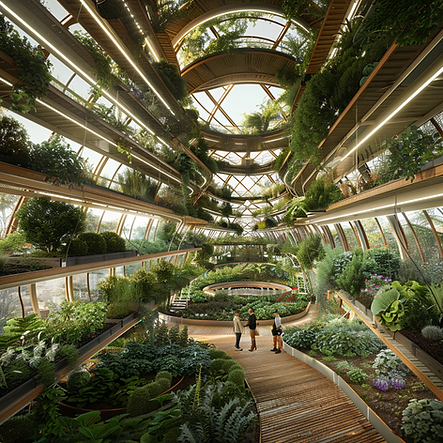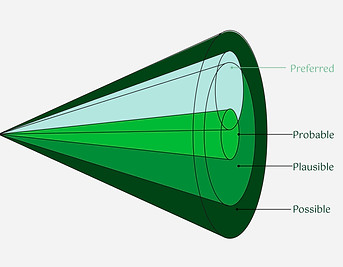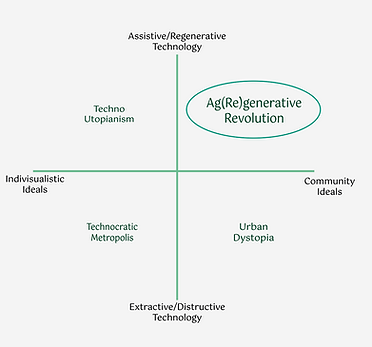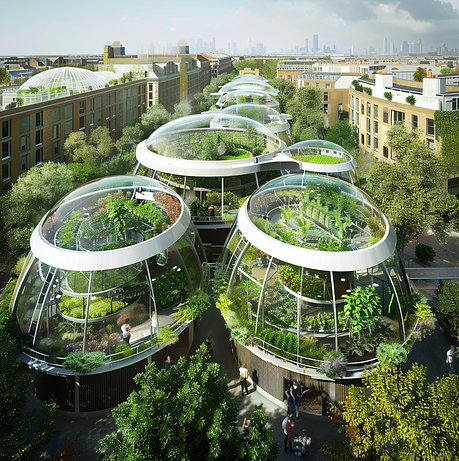Urban Eco Nodes
What if cities could feed themselves sustainably while empowering communities and protecting the planet? Urban Eco Nodes is a speculative design research project that envisions a sustainable future for London's food systems by 2040. Through the integration of advanced technologies and circular economy principles, the project proposes community-driven, regenerative food hubs that reduce environmental impact, empower communities, and foster urban resilience.

Client
University brief
Timeline
2 months (2024)
Type of Work
Speculative Design
Industry
Urban Food Systems
Core Competencies
-
Market Research & Data Analysis
-
The complete sight
-
Trend Analysis
-
Backcasting
-
Futures Cone
-
Circular Economy Principles
-
Scenario Development
Introduction
As urbanisation accelerates, cities face growing challenges in food security, environmental degradation, and resource depletion. London, like many global cities, struggles with unsustainable food supply chains, rising emissions, and increasing socio-economic disparities. The need for resilient, localised, and circular food systems is more pressing than ever.
Key challenges:
-
Dependence on industrialised, high-emission food supply chains
-
Food insecurity and unequal access to fresh, nutritious food
-
Loss of urban biodiversity and green spaces
-
Inefficiencies in waste management and resource use
The objective was to envision a sustainable future for London’s food systems by 2040 through a speculative design approach. By utilising key forecasting tools and analysing social, technological, and environmental trends, the project aimed to identify opportunities to foster resilience, reduce environmental impact, and empower local communities
Project Brief
Research Methodology
The research utilised speculative design methods to envision potential futures for urban food systems. This approach integrated insights from technological, social, and ecological trends, revealing key shifts that influence the future of food.

Hindsight
A historical analysis uncovered significant milestones in the evolution of food systems, highlighting pivotal moments that have shaped urban food production and agriculture from the 1700s to the present.

Trend Analysis
Based on a PESTLE-driven trend analysis, key shifts are transforming food systems towards circular, high-efficiency, and regenerative models:
-
Green Infrastructure: Integrating green spaces and urban farms for biodiversity and resilience.
-
Urban Farm-to-Table: Locally sourced food, reducing emissions, and promoting circular economy principles through zero-waste restaurants.
-
Urban Farming: Innovations like vertical farming and hydroponics for resource-efficient production.
-
Farmers' Markets & Community Gardens: Strengthening local food systems and improving food security.
-
Plant-Based Food: Expanding beyond food into beauty and household products, driven by consumer demand for sustainable, high-quality alternatives.
-
Conscious Consumption: Preference for home cooking and ethically sourced ingredients reinforcing transparency, sustainability, and innovation in food choices.

Drivers of Change
Population Growth
Rapid growth, nearing 10 billion by 2050, is putting pressure on food systems, with urbanisation driving increased demand and resource strain.
Climate Crisis
Global warming disrupts agriculture, exacerbating food and water insecurity. Industrial farming, deforestation, and synthetic fertilizers contribute to environmental harm, with food systems generating a third of greenhouse gas emissions.
Food Security
Rising hunger and food insecurity are worsened by population growth, food waste, and crises like COVID-19 and geopolitical conflicts. Reducing waste and ensuring equitable food access are critical for stability.
Scenario Matrix

Research found that while societal well-being continues to improve, environmental challenges like climate change and deforestation add complexity to urban resilience. By analysing societal dynamics, well-being, community structures, governance, and work systems—while integrating insights from the Fourth Industrial Revolution on digital transformation, connectivity, advanced analytics, and automation—the study developed a scenario matrix to explore how technology and evolving societal structures can shape sustainable urban food systems.

The preferred scenario, Ag(re)generative Revolution, was chosen for its vision of a future where technology supports regenerative, community-driven values—enhancing well-being, addressing urbanisation challenges, and fostering ecological and social balance. The Ag(re)generative Revolution emphasizes the integration of technological progress with ecological stewardship in urban planning, offering a pathway to a resilient and harmonious future.
Concept: Urban Eco Nodes
Symbiotic Urban Design - A Vision for Sustainable Cities
Urban Eco Nodes are self-sustaining, technology-driven food hubs designed to integrate seamlessly into London’s urban landscape. These circular hubs operate autonomously while connecting with the broader city ecosystem, creating a decentralised and community-led approach to urban food production.
All following images were created in Midjourney.


How it works?
At the core of this vision is a regenerative food system that prioritises:
-
Food sovereignty
-
Environmental stewardship
-
Urban resilience
By repurposing underutilised spaces—vacant lots, reclaimed buildings, and green patches—these hubs transform neglected areas into productive, ecologically harmonious urban farms.
Each borough-specific node is:
-
Tailored to meet local needs
-
Designed for accessibility and community involvement
-
Implemented with biophilic design principles to enhance biodiversity
AI-driven monitoring systems:
-
Optimise efficiency
-
Automate resource distribution
-
Facilitate collaboration between hubs
Together, these hubs form a connected green network that reduces food miles, strengthens food security, and fosters a more sustainable urban future.
Key Features
-
Smart Farming & AI: IoE systems optimise crop growth, monitor soil health, and enable real-time collaboration between nodes.
-
Innovative Methods: Vertical farming, hydroponics, and aquaponics support year-round, resource-efficient cultivation.
-
Community-Driven Solutions: Culturally relevant crops and resident membership plans foster local engagement and accountability.
-
Circular Economy Methodology : Localised food distribution, waste-to-compost systems, and regenerative land practices minimise waste and emissions.
-
Economic & Social Impact: Borough-based food hubs strengthen local economies, promote food sovereignty, and build stronger community ties.
-
Job Creation & Education: Nodes generate green jobs and provide training in urban agriculture and smart farming technologies.

Impact
The Urban Eco Nodes concept demonstrates how technology and ecological principles can intersect to create resilient, community-driven food systems. By reducing food miles, promoting local production, and fostering community engagement, the project presents a scalable model for urban sustainability. Using speculative design tools such as Complete Sight, trend analysis, futures cones, scenario matrix, and backcasting, the project reimagines urban food systems to address food insecurity and environmental challenges. By integrating circular economy practices, encouraging local decision-making, and leveraging smart farming technologies, it envisions cities as symbiotic hubs where biodiversity thrives alongside human communities.
While implementation presents technological, financial, and bureaucratic challenges, the project offers a compelling blueprint for future-ready, inclusive, and sustainable urban food systems—where innovation and environmental stewardship go hand in hand to create thriving, resilient communities.